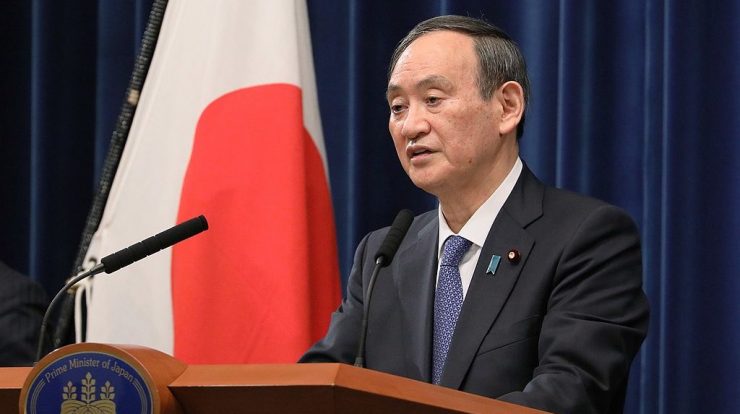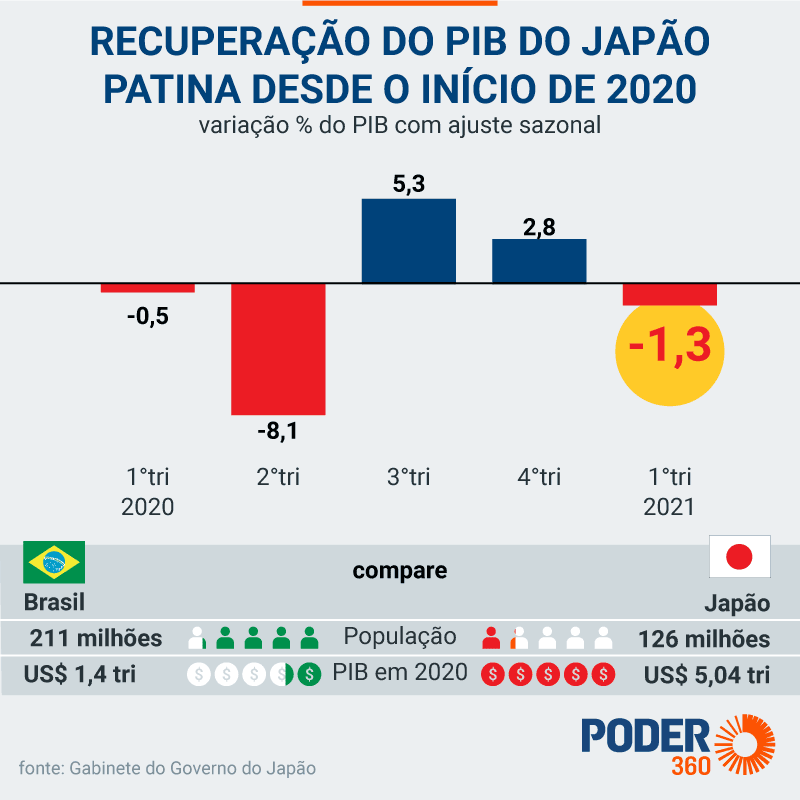
The approval of Japanese Prime Minister Yoshihide Suga fell sharply in 2021. Among the reasons: the epidemic worsened, with the enactment of new states of emergency, the economic decline and the debate over the holding of the Olympic Games.
In September 2020, the month in which Suga was elected, polls were released pointing to 66% rated their work well. In May 2021, Prof. The percentage is 32%, With 45% reject. The leader of the LDP has already taken office during the crisis caused by the pandemic, succeeding fellow party member Shinzo Abe, who resigned due to health reasons.
With vaccination at a slow pace in the country and an increase in the number of cases of Covid-19 virus, it was necessary to declare a state of emergency in several regions of the country. According to the coordinator of the Center for Asian Studies at ESPM, Alexander O’Hara, residents are dissatisfied with the government’s response to the pandemic.
“Yoshihide Suga lost support due to the economic issue, the lack of practical and effective results in fighting the disease, the return of the state of emergency, and the holding of the Olympics, which puts in the assessment of part of the population the public health of Japan at risk.”, He says.
The economy is also one of the reasons the Prime Minister’s valuation has deteriorated. During the first quarter of 2021, Japan’s GDP contracted by 1.3% compared to the previous three months. In annual comparison, the decline was 5.1%.
According to Alexander O’Hara, this was due to the worsening of the pandemic scenario. “Japan is a backward country in terms of vaccination, compared to the United States, the United Kingdom. With the return of the state of emergency, activities are closed and this has a negative impact on the economy.”
In addition, according to Alexander O’Hara, although the Japanese economy is the third largest in the world, Japan has a history of generally timid consumption patterns, exacerbated by the epidemic.
In January, the World Bank projected Japanese GDP growth of 2.5% in 2021, which is lower than that of other large economies.
Last Friday (May 21, 2021) the government added Okinawa to the list of areas subject to strict emergency measures to combat the Coronavirus, which includes Osaka, Hokkaido, Okayama and Hiroshima. Tokyo, where the Olympic Games are set to begin in about two months, is also under a state of emergency.
The Olympics, scheduled for July 23, is another factor in Prime Minister Yoshihide Suga’s low rating. The majority of the population opposes the Olympic Games. Search Asahi Shimbun Released on May 17 showed that 83% wish to cancel or postpone the event.
Nevertheless, the prime minister continues to advocate for Japan to host the Olympics. Suga insisted that the games could be played somehow ‘Safe and secure’. And the same Asahi Shimbum poll showed that 73% say they are not convinced of this.
With the growing opposition to this event, Prime Minister advertiser Who never put the Olympics first. Pressure is mounting to cancel or postpone the event. Last week, the Tokyo Society of Medical Practitioners – a group of nearly 6,000 physicians – Request Cancellation. The group claims that the health system is unable to accommodate the potential medical needs of international teams
the Olympics It has already been postponed. Initially, it should be held in 2020. For Alexander O’Hara, both the scenario in which the games take place, as well as the cancellation or postponement scenario, will be detrimental to Suga’s image.
“If the Olympiad is canceled, that will have some economic impact, because so many investments have been made. If the games happen, they probably won’t have an audience, because even the Japanese are afraid. They probably won’t have much participation and this has an effect in terms of revenue, because Without an audience, many actions lose their meaning, spend on advertising and marketing, and if there is no audience, then there is no need to spend. ”, He says.
As of May 20, only 4% of Japan’s population had received at least one dose of the vaccine, according to Our world in data. According to Alexander O’Hara, the country’s slow rate of vaccination is due to internal factors. “Japan took a long time to approve vaccines, required testing in the country, and that delayed the process. But the Japanese government has already bought vaccines and the process is expected to speed up.”.
According to him, with the advancement of vaccination, the Japanese economy will grow again. The economy is expected to return to normal with the vaccination. Because with the emergency, people will not work, and they will not go to the factory, which affects production and the economy. But the government has already bought and vaccines are coming. The important thing is for you to have more dynamism in the future. “, He explains.
According to him, the outlook is positive for the fiscal year ending in March 2022. “Despite the negative quarter, expectations indicate that during the year there will be an improvement in the economy.”.
However, the SUGA evaluation still needs to be addressed. The next general elections are scheduled for October this year. Yoshihide Suga risks running into the election with low popularity. If that happens, it will be difficult for him to be reelected. Perhaps the prime minister will not have enough time until then to improve the situation in Japan. “ analyzing.
Read on

“Friendly zombie guru. Avid pop culture scholar. Freelance travel geek. Wannabe troublemaker. Coffee specialist.”






:strip_icc()/i.s3.glbimg.com/v1/AUTH_59edd422c0c84a879bd37670ae4f538a/internal_photos/bs/2023/z/8/QelSQBSuShaAH1mfbZXA/lampada-acesa.jpg)
